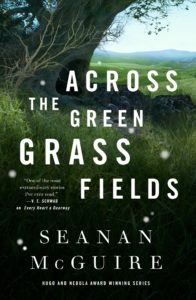Across the Green Grass Fields is the first of Seanan McGuire‘s Wayward Children series that I have read that’s entirely waywardness, and I liked it that way. There’s no mention of Eleanor West’s Home, nor do any of the characters from the previous five novellas in the series appear. I didn’t miss them at all, which I suppose means that I like my fantasy perfectly fine without a portal to tie it to this world.
McGuire’s main character, Regan Lewis, does need a portal. At seven, she sets great store in being normal, and she is a perfectly normal, happy child who likes reading, spinning until she gets dizzy, loves her parents and doesn’t even mind much that she doesn’t have any siblings. “But most of all, more than anything else in the world, more than even her parents (although thoughts like that made her feel so guilty the soles of her feet itched), Regan loved horses.” (p. 10) Fortunately, an unreasonable love of horses is an approved quirk because “strange was something to be feared and avoided above all else in the vicious political landscape of the playground, where the slightest sign of aberration or strangeness was enough to bring about instant ostracization.” (pp. 10–11)
That terrible fate is visited on one of Regan’s two best friends by the third in their charmed circle. One day Heather brings a small snake to school, and Laurel had been horrified. “‘What is that‘ Laurel had demanded, in the high, judgmental tone she normally reserved for bad smells and noisy boys.” (pp. 11–12) Heather’s joy at sharing something interesting with her friends turns into confrontation and an irreparable break as Laurel insists that girls don’t play with things like snakes. She pulls Regan away, and Regan doesn’t react quickly or strongly enough to mend the rip in the girls’ social fabric. In the months that follow, Regan sticks with Laurel. Even when Heather and her mother come to Regan’s house — and Regan’s own mother reminds her how cool she found holding a python at the fair — Regan chooses Laurel.
School years pass. Regan keeps choosing Laurel, even as she know the other girl’s rigidity can be harmful. (McGuire makes it clear that Laurel is exercising such control in her social circles because her home life is out of control in ways she cannot do anything about.) As middle school approaches, other girls’ bodies start changing but Regan’s remains stubbornly the same, if a bit taller and longer. When Regan finally asks her parents about what’s not happening, they tell her that she’s intersex. It’s a loving, factual, supporting conversation, but of course by its very nature it throws pre-adolescent Regan very badly for a loop. The next day, she tells her best friend what her parents told her. Big mistake.
For Laurel, there was one right way to be a girl, and it was Laurel’s way, always. Laurel believed in destiny. Laurel believed you had to be what people told you to be. And she’d almost convinced Regan to think the same way, that following Laurel’s rules would be enough to keep her safe and ordinary. But that had never been the truth. (p. 42)
At Regan’s revelation, Laurel freaks. So Regan does what what any reasonable person her age would do: she runs like hell. Out of the library, out of the school building, out of the school entirely and into the woods with a creek that leads home.
If only she could stay out here forever, she thought, she could be happy. If she never had to return to school and confront Laurel’s brutally triumphant, endlessly cruel eyes. If she could be absolved of the consequences of her own actions. If only, if only, if, if, if. (pp. 47–48)
If only the branches of two trees near the creek entwined to look something like a door? Regan sees just that, with twigs above them that seem to spell out “Be sure.” Even though she isn’t really, she says she is and steps through, out of this world and into the Hooflands.
One of the first things Regan sees after walking through the forest door is a unicorn. Soon after, she sees a centaur. The centaur, whose name is Pansy, is as astonished to see a human as Regan is to see creatures of myth come to life. As it turns out, the Hooflands are home to hoofed beings of many different sorts: not just centaurs and unicorns but satyrs, minotaurs, perytons, selkies, kirin and more. To them, humans are almost equally legendary — real, but also an omen of turmoil and change.
Across the Green Grass Fields is all about choices — particularly Regan’s choices — and their consequences. Those were more constrained in her home world, or at least she thought they were. In the Hooflands, her choices may have consequences for the whole world but they start with effects on Pansy’s band of centaurs who decide to take her in as one of their own. Everyone in the Hooflands says that she has a special destiny simply because she is a human in that world. Regan, though, does not believe in destiny. Is she right? What will she do if she’s wrong? What does she owe to her found family? What, if anything, does she owe to the parents she still loves and, occasionally, misses? And of course there are beings in the Hooflands who would take away her ability to choose; some of them do it in the way that adults shield children from bad choices, while others would do it directly and permanently.
As she grows, Regan learns more about choosing, and when she finally sets out to find out the truth about human destiny in the Hooflands, she learns that not everything the centaurs taught her is true. Even in a world that seems made for a horse-crazy girl, she has to stand on her own two feet.

